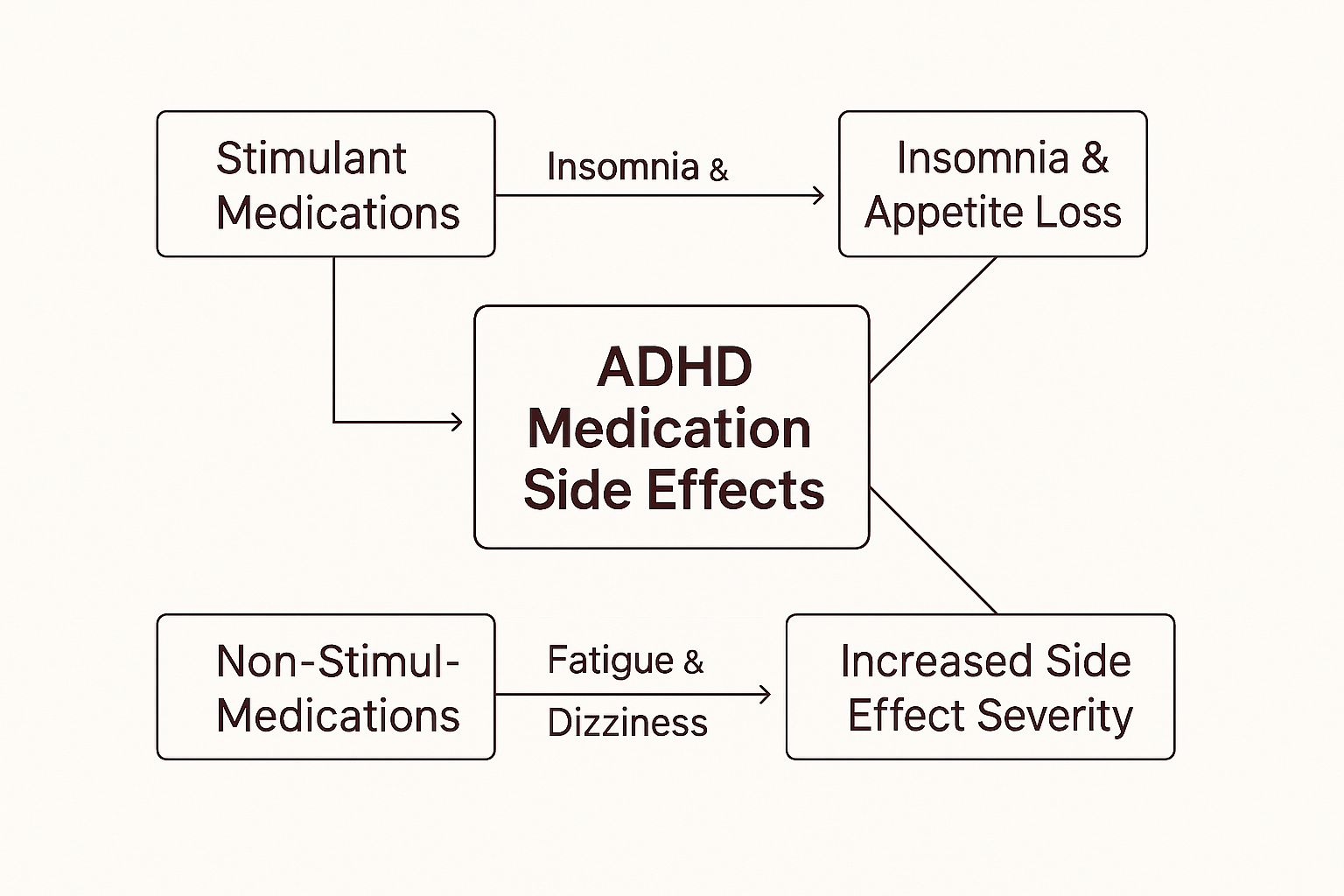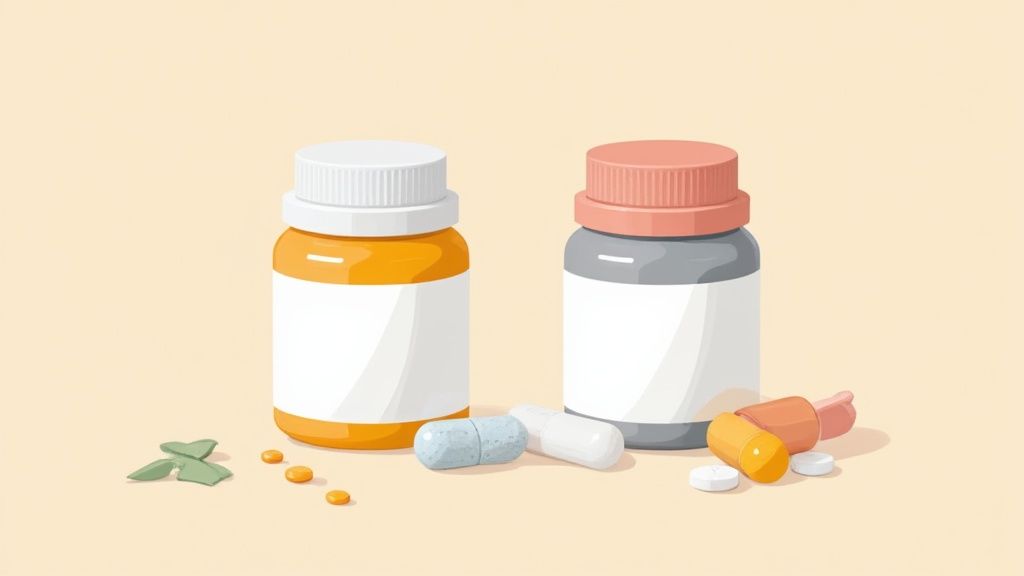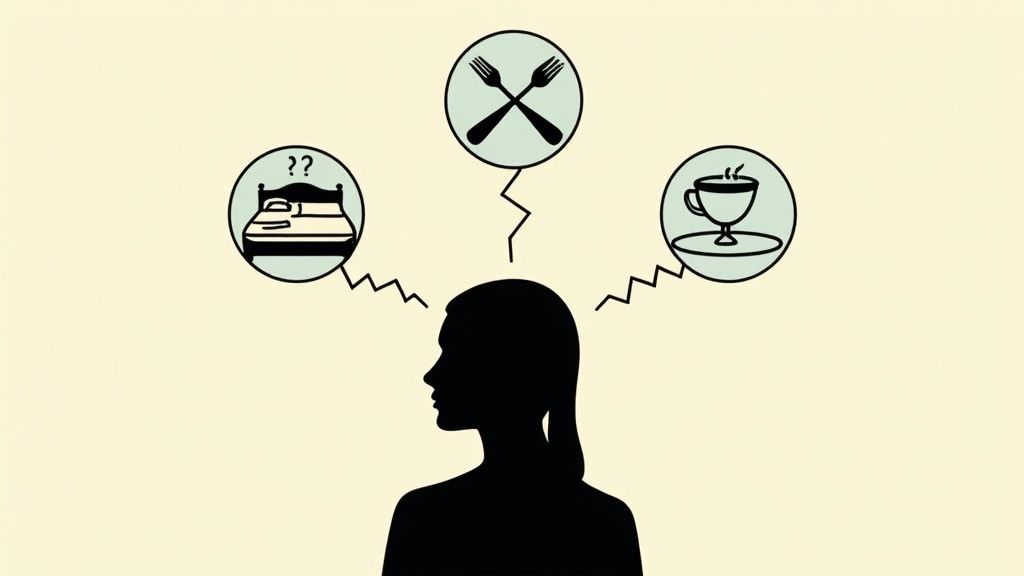When you start taking medication for ADHD, the most common things you might notice are a loss of appetite, sleep problems, and some mood changes. These reactions are usually mild and tend to fade as your body gets used to the new treatment. Still, knowing what they are is the first step to managing them well.
What Are The Most Common ADHD Medication Side Effects?
Beginning ADHD medication can feel like someone finally turned up the focus dial in your brain. That boost in clarity is what we're aiming for, but just like a brighter lightbulb gives off a little heat, adjusting your brain chemistry can come with some predictable side effects. These aren't just random reactions; they're often a direct result of the medication doing its job.
The good news is that most of these initial bumps in the road are well-understood and totally manageable. The key is to know what to look out for so you and your doctor can work together to find that sweet spot.
Common Side Effects of Stimulant vs. Non-Stimulant ADHD Medications
The side effects you might run into often depend on the type of medication you’re prescribed. The two main classes, stimulants and non-stimulants, work differently in the brain, which means they come with their own distinct set of common reactions.
Here’s a table comparing the most frequent side effects for each type. Understanding these differences will help you have a much more productive conversation with your doctor about which path might be best for you. For a deeper dive into the different kinds of treatments available, you can explore our guide to ADHD medication.
| Side Effect | Common in Stimulants (e.g., Methylphenidate, Amphetamine) | Common in Non-Stimulants (e.g., Atomoxetine, Guanfacine) |
|---|---|---|
| Appetite Loss | Very Common. Often noticeable within hours of taking the dose. | Less Common. Can occur, but generally milder and may develop over weeks. |
| Sleep Issues | Very Common. Difficulty falling asleep, especially if taken late in the day. | Less Common. Can cause drowsiness or fatigue instead of insomnia. |
| Mood Shifts | Common. Can cause irritability or emotional sensitivity, especially as it wears off. | Less Common. Mood changes are less frequent but can occur. |
| Headaches | Common. Often occurs when starting the medication or adjusting the dose. | Common. Similar to stimulants, headaches can be an initial side effect. |
| Dizziness | Less Common. Usually mild if it occurs. | More Common. Often reported, especially when first starting treatment. |
Thinking about it this way helps clarify why one person might feel wired and another might feel tired on different medications—it all comes down to the unique mechanism of each drug.
This image helps visualize the connection between the medication types and the side effects most often reported with them.
As you can see, stimulants are more directly linked to issues like insomnia, whereas non-stimulants are sometimes associated with fatigue.
How Common Are These Side Effects?
Experiencing some side effects is pretty normal, and the data backs this up. A 2010 survey found that 48% of patients reported at least one side effect from their ADHD medication, with loss of appetite and trouble sleeping being the top two.
But here’s the important part: the study also showed that only 21% of those people found the side effects "very or extremely bothersome." This suggests that for most, the issues are manageable and don't outweigh the benefits. You can read more about the findings from this patient survey for a closer look.
How Your Brain on ADHD Medication Causes Side Effects
To really get why ADHD medication side effects happen, it helps to peek under the hood at what’s going on inside the brain. Think of a brain with ADHD as having a powerful, high-speed communication network, but with a few areas of “spotty service.” This makes it tough for messages about focus, organization, and impulse control to get through reliably.
ADHD medications are like signal boosters for that network. They primarily work by increasing the amount of two key chemical messengers, also known as neurotransmitters: dopamine and norepinephrine. These are the chemicals your brain uses to regulate attention, motivation, and all those executive functions that can be a struggle.
When a medication boosts the levels of these neurotransmitters, that “spotty service” suddenly gets a major upgrade. Signals become clearer and stronger, which is why you can finally focus, get a handle on impulses, and stay on task. It's this very specific chemical tune-up that makes these medications so life-changing for so many people.
The Trade-Offs of Boosting Brain Signals
So, if the medication is just fixing a communication problem, why the side effects? It’s because those neurotransmitters—dopamine and norepinephrine—are multi-taskers. They don't just manage focus; they have their hands in a lot of different systems throughout your brain and body.
Boosting them to improve focus is a bit like turning up the volume on your favorite radio station. Sure, the music comes in crystal clear, but cranking up the power might also cause some static or interference on nearby channels. Those "other channels" are essential bodily functions like your sleep-wake cycle, your appetite, and even your emotional regulation.
This is the fundamental trade-off: The same mechanism that sharpens your focus can inadvertently disrupt the signals that control your appetite or tell your brain it’s time to wind down for sleep. The resulting side effects aren't random; they are predictable consequences of fine-tuning your brain chemistry.
For instance, the parts of your brain that govern alertness are wired very closely to the parts that manage hunger. By keeping your brain in a state of high alert and focus, the medication can easily drown out your body's hunger cues. In the same way, keeping the "focus" switch flipped to "on" can make it really hard to find the "off" switch for sleep.
Why Different Formulations Matter
This is also why your doctor has options beyond just one type of pill. Medications come in different formulations, and understanding the difference is key. Extended-release (ER) versions, for example, are designed to give you a much smoother, more gradual release of the medication over the day.
Think of it like a slow, steady sunrise and sunset instead of someone flicking a bright light on and then abruptly shutting it off.
This gradual delivery helps minimize the sharp chemical spikes and drops that can trigger some of the most common side effects. It provides a more stable level of focus all day and can soften or even prevent the "crash" that some people feel when an immediate-release dose wears off. Knowing this helps you have a much more productive conversation with your doctor about finding the right medication and formulation for your unique brain and lifestyle.
Understanding Less Common and Serious Risks
While the most common side effects of ADHD medication are usually mild and fade over time, it’s important to know about the less common but more serious risks. Think of this as a safety briefing—not to cause anxiety, but to empower you as an active participant in your own healthcare. Being aware is the best way to ensure your treatment is both safe and effective for the long haul.
The biggest concern usually revolves around the cardiovascular system. Stimulant medications work by increasing norepinephrine, which can put a little extra stress on the heart. For many people, this results in a small, sustained increase in heart rate and blood pressure.
Monitoring Cardiovascular Health
For someone with a healthy heart, this slight uptick is typically nothing to worry about. But for individuals who have pre-existing heart conditions—whether they know about them or not—that added strain can be a real risk.
This is why, before you even start a stimulant, your doctor should do a deep dive into your personal and family medical history. You should be on the lookout for any red flags and report them immediately. These include:
- Chest pain or a feeling of pressure
- Shortness of breath, even with mild activity
- Fainting spells or feeling dizzy and lightheaded
- A heart rate that feels constantly fast or irregular (palpitations)
If you experience any of these symptoms, it’s a sign to get medical attention right away to make sure your treatment plan is still the right and safe choice for you.
Significant Mood and Psychological Changes
Another rare but serious group of side effects involves psychological changes. While a bit of irritability can be a common, temporary side effect, some people might experience much more significant shifts in their mood and thinking.
In very rare instances, stimulants have been linked to new or worsening psychiatric symptoms. This could look like severe anxiety, panic attacks, or even psychosis (a break from reality). The risk is higher for people who have a personal or family history of conditions like bipolar disorder or psychosis.
It’s absolutely vital to know the difference between just having a "bad mood" and a severe psychological reaction. If you or someone you care about has a sudden, dramatic change in personality, thinking, or mood after starting medication, call your doctor without delay.
On top of this, a major 2023 systematic review that looked at over 2.28 million participants discovered that children and teens taking methylphenidate were 1.36 times more likely to have serious adverse events than those who weren't. The side effects they noted included things like blurred vision, dry eyes, and changes in eye pressure. You can dive deeper into the complexities of assessing these risks in the full study published in a top medical journal.
Addressing Long-Term Treatment and Safety Concerns
When you're considering ADHD medication, whether for your child or for yourself as an adult, it's completely natural to wonder about the long haul. What happens after years of treatment? The questions often circle around physical development, mental health, and the risk of dependency. This isn't just about managing today's side effects; it's about looking at the big picture of lifelong health.
The good news is that we aren't just guessing here. Decades of research give us a solid footing to understand the long-term safety of these medications. We can move past the anxiety and into a place of informed clarity, empowering you to make decisions with confidence, not fear.
Growth and Physical Development
One of the most common worries I hear from parents is about growth. "Will stimulant medication stunt my child's growth?" It's a valid question, especially since early studies did suggest a possible link between stimulants, appetite suppression, and slight delays in height and weight.
However, the latest and most extensive research paints a much more reassuring picture. While some children might see a small, temporary dip in their growth speed right after starting medication, most long-term studies show it doesn't typically affect their final adult height. Any small effects on weight can almost always be managed with smart nutritional strategies and timing meals.
The key takeaway from years of data is that with proper medical monitoring, including regular growth checks, the risk of significant, permanent growth suppression from standard doses of ADHD medication is very low.
This means that while it's an important conversation to have with your doctor, it's not the major barrier it was once thought to be. The best tools you have are open communication and consistent follow-up appointments to ensure healthy development.
Long-Term Mental and Neurological Health
Another big question mark for many is the brain. Will taking medication for years change a person's personality or set them up for other mental health problems down the road? To get real answers, we look to longitudinal studies—the kind that follow people over many, many years.
Thankfully, recent large-scale research has been incredibly reassuring. A major international study published in The Lancet Psychiatry in 2023 tracked children and adolescents for two years. It found that using methylphenidate (the active ingredient in drugs like Ritalin and Concerta) did not lead to negative outcomes for their growth, mental health, or neurological development. The study provides strong evidence supporting the long-term safety of this common treatment. You can learn more about these important safety findings and see what they mean for families.
Ultimately, the scientific consensus is pretty clear: when prescribed and monitored correctly, ADHD medications have a well-established safety profile. For many people, the risks of untreated ADHD—like academic struggles, social isolation, and a higher rate of accidents—are far greater than the manageable risks of medication.
Your Action Plan for Managing Common Side Effects
Knowing what to expect from ADHD medication is one thing, but having a real-world playbook to handle the bumps in the road is something else entirely. Think of this as your go-to toolkit for managing the most common side effects. These strategies are simple, practical, and designed to work with your treatment, not against it, helping you feel more comfortable and in control.
Many of these are behavioral adjustments, which is great news—it means you can start trying them right away. It’s all about building routines and habits that support your body as it gets used to the medication.
Tackling Appetite Loss
One of the most frequent guests with stimulant medication is a suppressed appetite. This can be a real concern, especially for parents with growing kids. The medication can make food seem completely uninteresting, but your brain and body still need that fuel. The trick is to work smarter, not harder.
- Front-Load with a Protein-Packed Breakfast: Make sure you or your child eats a solid, high-protein meal before the first dose of medication kicks in for the day. This locks in essential nutrients from the get-go.
- Plan for the "Rebound" Hunger: When the medication starts wearing off in the evening, appetite often comes roaring back. Be ready for it! Have a healthy, satisfying dinner planned and prepped.
- Embrace Nutrient-Dense Snacks: Don’t count on big, sit-down meals during the peak medication hours. Instead, keep small, calorie-rich snacks on hand. Think nuts, cheese, Greek yogurt, or protein smoothies.
These simple timing tweaks can make a massive difference in staying nourished without turning every mealtime into a power struggle.
Overcoming Sleep Problems
Stimulants are designed to increase alertness, so it's not a huge shock when they decide to interfere with your sleep schedule. If you find yourself staring at the ceiling at 2 a.m., it's a clear sign your routine needs a little tune-up. A consistent and relaxing "sleep hygiene" routine isn't just a nice idea—it's critical.
The goal is to send your brain clear signals that it’s time to power down, even when the medication has been telling it to stay switched on all day. You're basically creating a buffer zone between your busy, medicated day and a restful night.
Here are a few proven tactics:
- Time Your Last Dose Carefully: This is a big one. Work with your doctor to make sure your last dose (especially if it's an immediate-release formula) is taken at least 4-6 hours before you want to hit the pillow.
- Establish a Digital Curfew: The blue light from our screens—phones, tablets, TVs—is a notorious enemy of sleep. It messes with melatonin, the hormone that tells your brain it's nighttime. Power down all your electronics at least an hour before bed.
- Create a Relaxing Ritual: Your brain loves predictability. A warm bath, reading a physical book (not on a screen!), listening to calm music, or doing some light stretching can become powerful sleep cues.
Action Plan for Common Side Effects
Here’s a quick-reference table to help you put these strategies into practice.
| Side Effect | Management Strategy | When to Try It |
|---|---|---|
| Appetite Loss | Eat a large, protein-rich breakfast before the first dose. | Every morning, before medication. |
| Appetite Loss | Keep small, high-calorie snacks like nuts or yogurt on hand. | During midday when appetite is lowest. |
| Sleep Problems | Take the last dose of immediate-release medication 4-6 hours before bed. | Daily, in consultation with your doctor. |
| Sleep Problems | Set a "digital curfew" and turn off all screens 1 hour before bed. | Every night as part of your wind-down routine. |
| Moodiness | Talk to your doctor about switching to an extended-release (ER) formula. | If you consistently feel a "crash" in the afternoon. |
| Moodiness | Learn coping skills through therapies like Cognitive Behavioral Therapy. | For long-term emotional regulation and support. |
This table isn't a substitute for medical advice, but it’s a great starting point for conversations with your doctor and for things you can try at home right away.
Managing Moodiness and the Rebound Effect
Ever feel a wave of irritability, anxiety, or just intense emotion hit you in the late afternoon or evening? There's a name for that: the "rebound effect." It often happens when an immediate-release medication wears off too quickly, causing a sudden drop in neurotransmitter levels. It feels like a smooth car ride coming to a screeching, bumpy halt.
One of the most effective ways to address this is by talking to your doctor about an extended-release (ER) formulation. These medications are designed to provide a much smoother "off-ramp," releasing the medicine gradually to prevent that sudden crash.
On top of that, behavioral strategies can be a game-changer for building emotional regulation skills. Many people find that learning specific coping mechanisms through approaches like Cognitive Behavioral Therapy for ADHD gives them powerful, long-term tools for navigating those mood fluctuations, with or without medication.
When You Should Talk to Your Doctor
Figuring out ADHD medication is a team sport, and your doctor is your most valuable player. It's crucial to know when to manage a side effect on your own and when it's time to pick up the phone. Think of it as knowing the difference between a minor inconvenience and a real warning sign.
Some side effects are more of a nuisance than a danger, like a persistent dry mouth or a low-grade headache that just won't quit. These are perfect to bring up at your next scheduled appointment. Try keeping a simple log of these symptoms—what they feel like, when they pop up, and how much they bother you. This makes for a much more productive conversation with your doctor.
However, some situations demand a faster response.
When to Call Your Doctor Immediately
Certain side effects are red flags that you should never ignore. They can signal a more serious reaction to the medication and mean you need to call your doctor’s office right away. Don’t wait for your next check-in if you experience any of the following:
- Chest pain, shortness of breath, or heart palpitations. Any new or alarming heart-related symptoms need to be looked at immediately.
- Significant mood changes. This isn't just a bad day. We're talking about sudden, severe anxiety, panic attacks, or feelings of hopelessness that feel completely out of character. The line between ADHD and anxiety can sometimes blur, so it’s important to tell your doctor what's happening. You can learn more about the connection between ADHD and anxiety to better understand these feelings.
- Fainting spells or extreme dizziness. This could point to a problem with your blood pressure that requires medical attention.
Remember, tweaking your dose, changing when you take your medication, or even switching to a different one is a totally normal part of the process. Your doctor fully expects to work with you to get the fit just right.
Your best tool for getting through this treatment journey safely and successfully is open, honest communication. Never hesitate to reach out.
Your Top Questions About Side Effects, Answered
When you're starting an ADHD medication, it's completely normal to have a ton of questions. Getting straight answers is the best way to feel confident and in control of your treatment. Let's tackle some of the most common things people wonder about.
Can ADHD Medication Side Effects Change Over Time?
Yes, they definitely can. A good way to think about it is like breaking in a new pair of hiking boots—they might feel a bit stiff or uncomfortable at first, but they soften up with time. It's the same with many common ADHD medication side effects, like a mild headache or an upset stomach. These often pop up when you first start a medication or increase the dose.
For many people, these initial side effects fade away within a couple of weeks as their body gets used to the new normal. Some side effects, like a reduced appetite, might linger. The key is to pay attention to how you're feeling and keep an open line of communication with your doctor about anything that sticks around or bothers you.
Your body's first reaction isn't always the final verdict. Give it some time to adjust, but never hesitate to talk to your doctor about side effects that are persistent or concerning.
Do Side Effects Differ Between Brand-Name and Generic Medications?
This is a great question. By law, both brand-name and generic drugs have to contain the exact same active ingredient in the same dose. For almost everyone, this means they’ll work in the exact same way. The only real difference is in the inactive ingredients—the fillers, dyes, and binders that hold the pill together.
While it's not common, a very small number of people might be sensitive to one of these inactive ingredients. If you've switched from a brand-name to a generic (or vice-versa) and feel like something is off with its effectiveness or side effects, that's a valid concern. It's definitely something worth bringing up with your doctor.
How Long Should I Wait to See if a Side Effect Goes Away?
A good rule of thumb is to give your body about 2-4 weeks to adjust to a new medication or dose. If you're dealing with a mild side effect that you can manage, it's usually reasonable to wait it out for this long to see if it resolves on its own.
However, this timeline is not for serious reactions. If a side effect is getting in the way of your daily life, causing you real distress, or feels alarming (like chest pains or intense anxiety), you need to call your doctor right away. Safety always comes first, so please don't wait to report a problem that feels serious.
At Sachs Center, we understand that finding the right treatment path is a journey. Our telehealth-based diagnostic assessments for ADHD and Autism are designed to provide clarity and support, helping you make informed decisions about your health in the comfort of your home. If you're ready to gain a deeper understanding of your neurodiversity, learn more about our services at https://sachscenter.com.



